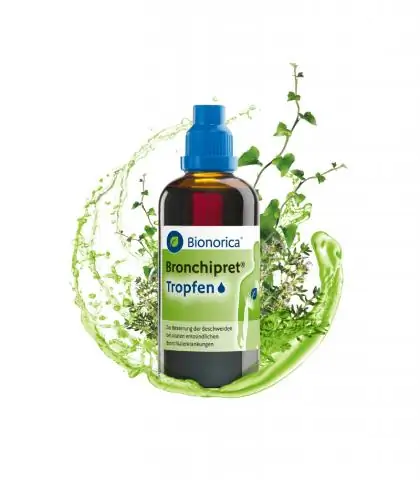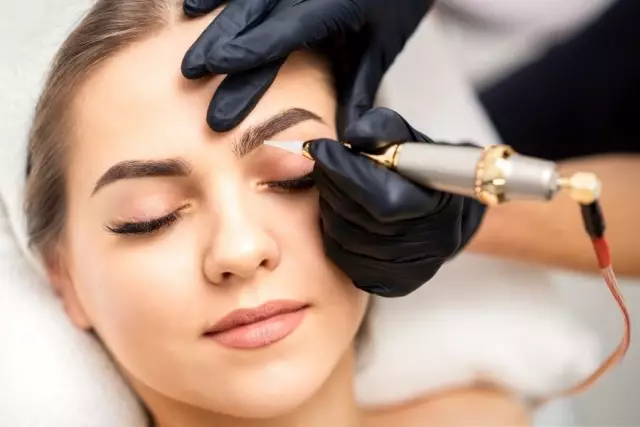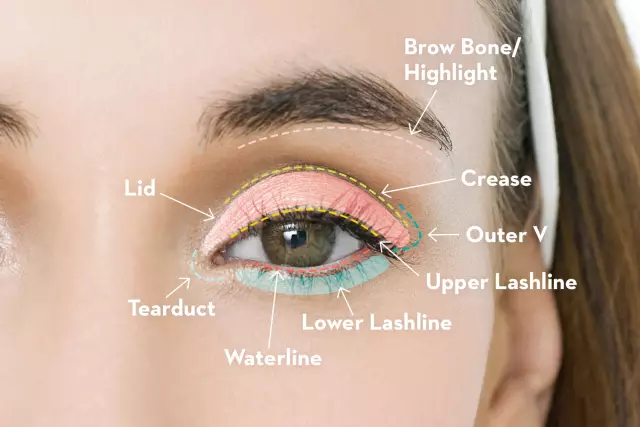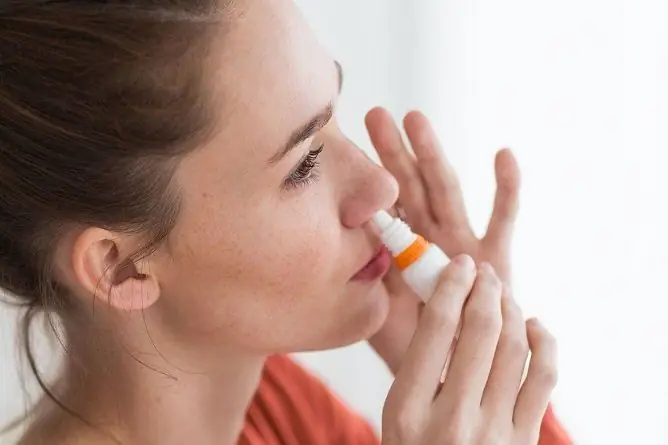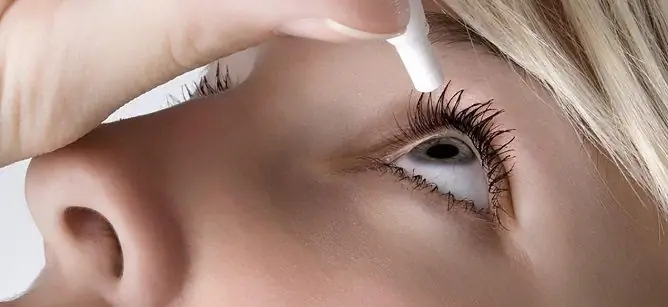- Author Rachel Wainwright wainwright@abchealthonline.com.
- Public 2023-12-15 07:39.
- Last modified 2025-11-02 20:14.
Lekrolin
Lekrolin: instructions for use and reviews
- 1. Release form and composition
- 2. Pharmacological properties
- 3. Indications for use
- 4. Contraindications
- 5. Method of application and dosage
- 6. Side effects
- 7. Overdose
- 8. Special instructions
- 9. Application during pregnancy and lactation
- 10. Use in childhood
- 11. Drug interactions
- 12. Analogs
- 13. Terms and conditions of storage
- 14. Terms of dispensing from pharmacies
- 15. Reviews
- 16. Price in pharmacies
Latin name: Lecrolyn
ATX code: S01GX01
Active ingredient: cromoglicic acid
Manufacturer: Santen OY (Finland)
Description and photo updated: 2018-26-11
Prices in pharmacies: from 81 rubles.
Buy

Lekrolin is an antiallergic drug for local use in ophthalmology, which has a membrane stabilizing effect.
Release form and composition
Lekrolin is produced in the form of eye drops: colorless or pale yellow transparent solution (10 ml in a white polyethylene bottle sealed with a plastic dropper stopper with a screw cap, in a cardboard box 1 bottle; 0.25 ml in a tube-dropper, in an aluminum bag foil and paper covered with polyethylene, 10 pcs., soldered in the form of a plastic tape, in a cardboard box 2 bags).
1 ml of solution contains:
- active substance: sodium cromoglycate - 20 mg;
- auxiliary components: polyvinyl alcohol, glycerol, disodium edetate, water for injection; additionally in a solution in a dropper bottle - benzalkonium chloride.
Pharmacological properties
Pharmacodynamics
Lekrolin is an antiallergic drug, a stabilizer of mast cell membranes. The mechanism of action of the agent is to inhibit the process of degranulation of mast cells and, as a result, to suppress the release of biologically active substances from them, leading to the development of allergic reactions, including bradykinin, histamine, leukotrienes (including a slowly reacting substance). Lekrolin demonstrates the greatest effectiveness with prophylactic use. Against the background of allergic diseases, the absolute clinical effect can be achieved after a few days or weeks of drug therapy.
Pharmacokinetics
Sodium cromoglycate through the mucous membrane of the eye is absorbed to a small extent. The half-life of the active substance is 5-10 minutes, systemic bioavailability is less than 0.1%.
Indications for use
- allergic conjunctivitis;
- keratoconjunctivitis;
- allergic keratitis;
- irritation of the mucous membrane of the eyes due to allergic reactions caused by exposure to such factors as occupational hazards, household chemicals, ophthalmic medicines, cosmetics, plant pollen, animal dander, adverse environmental conditions.
Contraindications
- age up to 4 years;
- hypersensitivity to any of the constituents of the antiallergic agent.
Instructions for the use of Lekrolin: method and dosage
It is recommended to inject Lekrolin eye drops into the conjunctival sac. The initial dose is 1-2 drops in each affected eye 4 times a day with an interval of 4-6 hours. If necessary, the frequency of injections can be increased up to 6-8 times a day. Instillation of the drug should be carried out until the symptoms of the disease are completely removed.
The treatment of seasonal allergic conjunctivitis should be started immediately after the first symptoms of the lesion appear; for prophylactic purposes, Lekrolin should be used before the expected contact with the allergen, that is, before the pollen season. Therapy should be continued throughout the flowering season, or longer if symptoms persist. If within a few weeks of using the drops you cannot achieve the expected therapeutic effect, you should consult your doctor.
Lekrolin eye drops, produced in a tube-dropper, do not contain a preservative in the composition, which slows down the healing process of corneal and conjunctival wounds; therefore, these drops can be administered to patients with hypersensitivity to preservatives.
Before using Lecrolin in a dropper tube, open the bag containing the drug along the dotted line. After separating one of the extreme dropper tubes, the package must be carefully closed. After making sure that the solution is in the lower part of the dropper tube, the latter must be opened and 1-2 drops of the solution are injected into the conjunctival sac of each eye. The dose contained in the tube is sufficient for instillation in both eyes, the drug remaining after a single use cannot be used.
Side effects
When applied topically, cromoglicic acid is generally well tolerated and rarely causes eye irritation. These local irritation symptoms include:
- often (more than 1/100): short-term burning sensation, rapidly passing visual impairment;
- extremely rare (less than 1/10 000): lacrimation, dry eye syndrome, foreign body sensation in the eye, conjunctival edema, allergic reactions; in the presence of benzalkonium chloride in Lekrolin - meibomite and superficial damage to the corneal epithelium.
Overdose
In the course of animal studies, an extremely low degree of local and systemic toxicity of cromoglycic acid was revealed. In the case of topical use of sodium cromoglycate, overdose symptoms are unlikely. However, if an overdose is suspected, for example, symptoms such as nausea occur, symptomatic treatment is recommended.
special instructions
Since the preservative benzalkonium chloride is contained in the drops in dropper bottles, they should not be used when wearing contact lenses. Before instillation, contact lenses are recommended to be removed and reinserted no earlier than 15 minutes after the instillation of the product.
Since the drops in the dropper tube do not include a preservative, they can be used by patients wearing any type of contact lens.
The vial with the drug must be closed after each injection. Do not allow the tip of the pipette to touch the eyes.
Influence on the ability to drive vehicles and complex mechanisms
If a temporary loss of vision clarity occurs after the administration of Lekrolin, patients are not recommended to drive vehicles or other potentially dangerous and complex mechanisms immediately after using eye drops.
Application during pregnancy and lactation
During pregnancy and breastfeeding, ophthalmic drops can be used when the expected benefits of treatment for the woman outweighs the possible risk of side effects for the fetus / baby.
Pediatric use
According to the instructions, Lekrolin is contraindicated for use in children under 4 years of age.
Drug interactions
Until now, cases of adverse interactions of cromoglycic acid with other drugs have not been described.
The use of this active substance can help reduce the need for the use of ophthalmic preparations, which include glucocorticosteroids.
Analogs
Analogues of Lekrolin are: Allergo-Komod, KromoGEXAL, Kromospir, Intal, Dipolkrom, Hi-Krom, Krom-allerg, Nalkrom, Optivell, Cromoglycic acid.
Terms and conditions of storage
Store in a place protected from light, out of reach of children, at a temperature of 15-25 ° C.
Shelf life - 3 years, after opening the package with a tube-dropper or bottle-dropper - 1 month.
Terms of dispensing from pharmacies
Available without a prescription.
Reviews about Lekrolin
On medical sites, reviews of Lekrolin are in most cases positive. Patients treated with the drug note its high efficiency in eliminating irritation and redness of the eyes, these symptoms, according to their reviews, are removed even with a single use of drops. It is also indicated that Lekrolin shows very good results when used before the onset of flowering of the plant provoking the disease, for the prevention of seasonal allergic conjunctivitis. In the treatment of allergic reactions, an improvement in the condition can be observed after several days or weeks of using the drops. The advantages of the tool also include its availability and low cost.
There are, however, reviews that indicate an insufficient or too short-term effect of the drug, some patients note the development of addiction. The disadvantages of drops include the appearance after their introduction of a white film on the eyelashes and eyelids. There are very few complaints about the development of adverse reactions.
The price of Lekrolin in pharmacies
The price of Lekrolin can be 75-95 rubles for a 10 ml dropper bottle.
Lekrolin: prices in online pharmacies
|
Drug name Price Pharmacy |
|
Lekrolin 20 mg / ml eye drops 10 ml 1 pc. RUB 81 Buy |

Maria Kulkes Medical journalist About the author
Education: First Moscow State Medical University named after I. M. Sechenov, specialty "General Medicine".
Information about the drug is generalized, provided for informational purposes only and does not replace the official instructions. Self-medication is hazardous to health!


